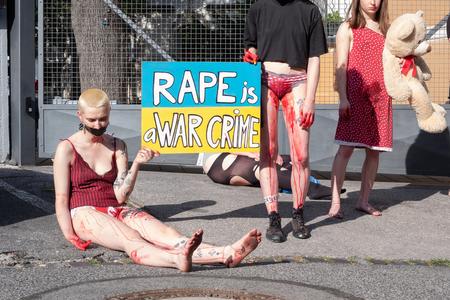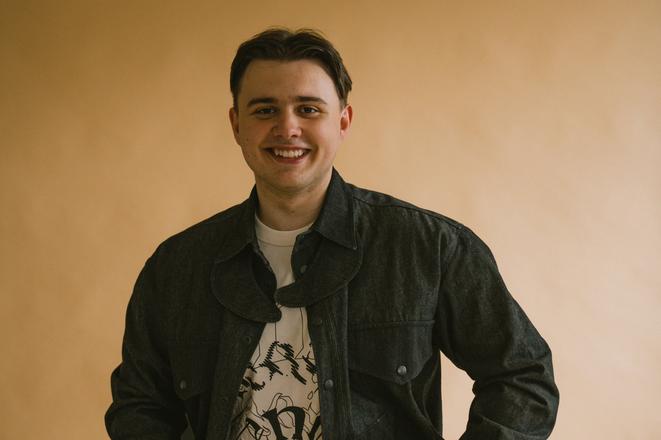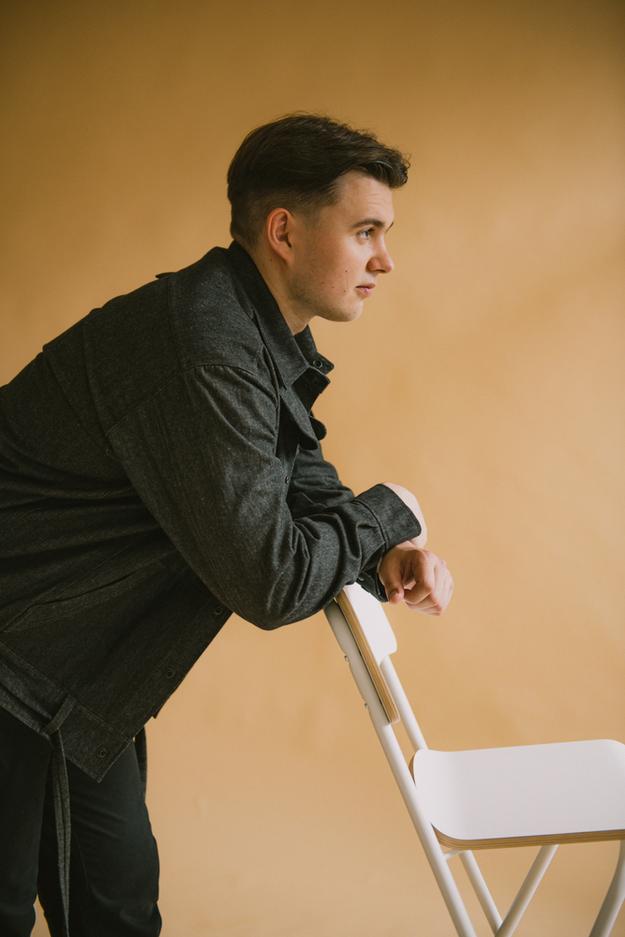Ukrainian version | Slovak version
Vladyslav Yatskovyi had it all planned out, and saw himself becoming a dentist in Kyiv. Life had other ideas.
Instead of dentistry, he has ended up pursuing journalism studies in Slovakia. A week after Russia’s full-scale invasion of Ukraine on February 24, 2022, he joined a Slovak television channel.
“TA3 [a news channel] was looking for students who would produce news in Ukrainian,” Yatskovyi told the magazine fjúžn. “I told myself that this was great, because I could at the same time help people who were coming to Slovakia.”
The content he produces with other Ukrainian colleagues has evolved since they first started. Nowadays there is less news and more stories about how Ukrainian newcomers can enjoy life in Slovakia, and where they can get together. Moreover, he debunks disinformation about the war in Ukraine via his social media profiles and helps fundraise money for Ukrainian soldiers within the Oberih volunteer organisation.
None of this would have happened had it not been for a visit to Yatskovyi’s high school, from which he graduated four years ago, by an organisation seeking to attract students to study in Slovakia. At first, he did not pay attention to the offer; in fact, it was his mother who asked him whether he would consider studying medicine abroad.
With no command of the Slovak language, he initially started to study biology and chemistry at Pavol Jozef Šafárik University in Košice, eastern Slovakia, hoping to switch to medicine a year later. But he found the language barrier to be a huge problem.
“Even the elements of the periodic table have got different names in Slovak,” the Ukrainian said. “I often struggled to understand the lectures, despite the lecturers’ efforts to help me, and that discouraged me.”
He soon quit university and dropped his plan to become a dentist, deciding instead to focus on his Slovak language skills. He resolved to apply for a media studies course in Košice.
“Anything connected with the media space and communication resonated with me,” the Ukrainian told The Slovak Spectator.
Nevertheless, his choice began to worry his parents.

Gongadze murder case was a red flag
Yatskovyi’s parents, and even his secondary school teachers, repeatedly told him that doctors were very much needed everywhere and, unlike journalists, were also honoured. But regardless of their concerns, they supported his decision.
On a summer’s day in 2020 in his hometown of Noskivtsi, in Ukraine’s Vinnytsia Oblast, as he was helping his parents in the garden, he received a letter from Comenius University in Bratislava. The Ukrainian had already been accepted by Pavol Jozef Šafárik University, and now Comenius had also offered him a place. Eventually he decided to study in the Slovak capital.
“I was ecstatic,” the journalism student said.
The Bratislava university offers what is considered to be one of the best journalism programmes in Slovakia.
One of the reasons why his parents were worried about his future is the fact that the role of journalist is not considered a very safe profession in Ukraine – and this had been the case even before the war.
Yatskovyi, for example, points to the 2000 murder of Ukrainian investigative journalist Georgiy Gongadze near Kyiv, an event which sparked massive anti-government protests. Several police officers have been sentenced for his murder, but no one has been convicted of ordering the killing. Subsequent investigations into the case have led to claims that Leonid Kuchma, the president of Ukraine at the time of Gongadze’s murder, was involved (he was arrested in 2011, but the charges were later dismissed) and of malfeasance by various Ukrainian officials.
Yatskovyi sees similarities with the 2018 Ján Kuciak murder case in Slovakia.
The people who murdered the Slovak investigative journalist and his fiancée, Martina Kušnírová, are now in jail – but the man charged with ordering the killing, businessman Marian Kočner, has been acquitted twice (the case is ongoing). Kočner’s associate, Alena Zsuzsová, was found guilty in the Kuciak case in May; Kočner himself is serving a prison sentence for financial crimes, which Kuciak had written about.
In addition to his journalism studies and work at TA3, Yatskovyi also explains the war in Ukraine, both in Slovak and Ukrainian, on Instagram and Telegram, using information provided by Ukrainian and foreign media, the Ukrainian Defence Ministry, and the Institute for the Study of War, a US-based think tank.
“I want Slovaks to know what is happening in Ukraine,” he said. “Some write to me and say that they are right, not me, but I don’t block them.”
He hopes that he can help debunk war-related lies circulating in Slovakia, a country which has long struggled to deal with disinformation. The Ukrainian has more than 3,000 followers on Instagram.
Helping Ukrainian soldiers
As for the conflict itself, Yatskovyi remains confident that his homeland will triumph. At one point he was determined to join the Ukrainian army. His application was rejected because he was a student and lacked military experience. Instead, he was asked to help his motherland from where he was staying - Slovakia.
With a group of Ukrainians, he thus established Oberih, a volunteer organisation. The group has bought a combat buggy for Ukrainian soldiers. Drones, socks, headphones for artillery operators and many other things have followed.
“Gradually, others began to join in. Everyone helped as much as they could,” Yatskovyi said, noting that it’s important to support Ukraine’s soldiers. “Without them, Ukraine will cease to exist.”
On his social media, he recently fundraised money so that he could buy a thermal vision device for the unit of a friend.
The Ukrainian also helps organise public gatherings in support of Ukraine.
“What Ukrainians need above all is for people not to forget about them,” he adds.
When the war ends, Yatskovyi wants to return home and participate in the reconstruction of Ukraine, but he does not rule out moving between Ukraine and Slovakia.
“Our generation will be decisive and the restoration of Ukraine will depend on it,” he concluded.
This story was published with support from the International Press Institute's Ukraine regional reporting fund.
Author: Elena Senková


 Ukrainian journalism student Vladyslav Yatskovyi. (source: Kvet Nguyen)
Ukrainian journalism student Vladyslav Yatskovyi. (source: Kvet Nguyen)
 Vladyslav Yatskovyi. (source: Kvet Nguyen)
Vladyslav Yatskovyi. (source: Kvet Nguyen)